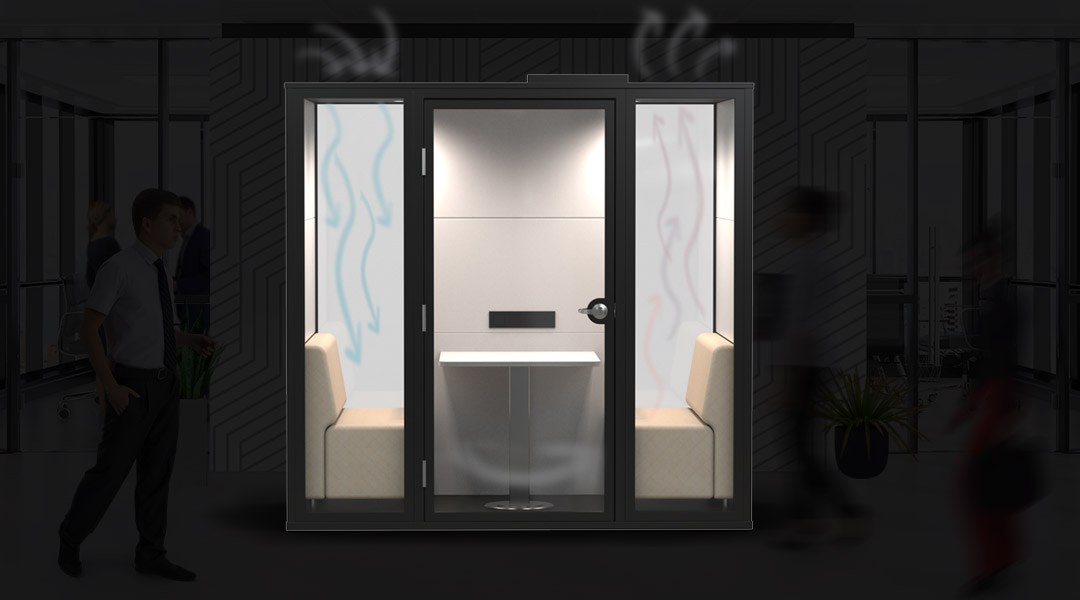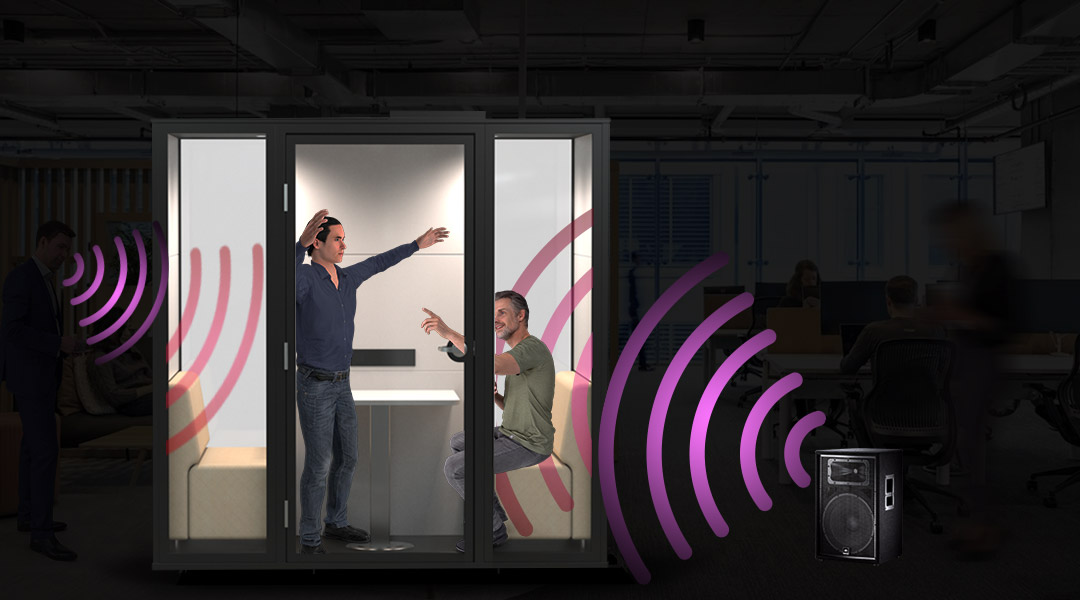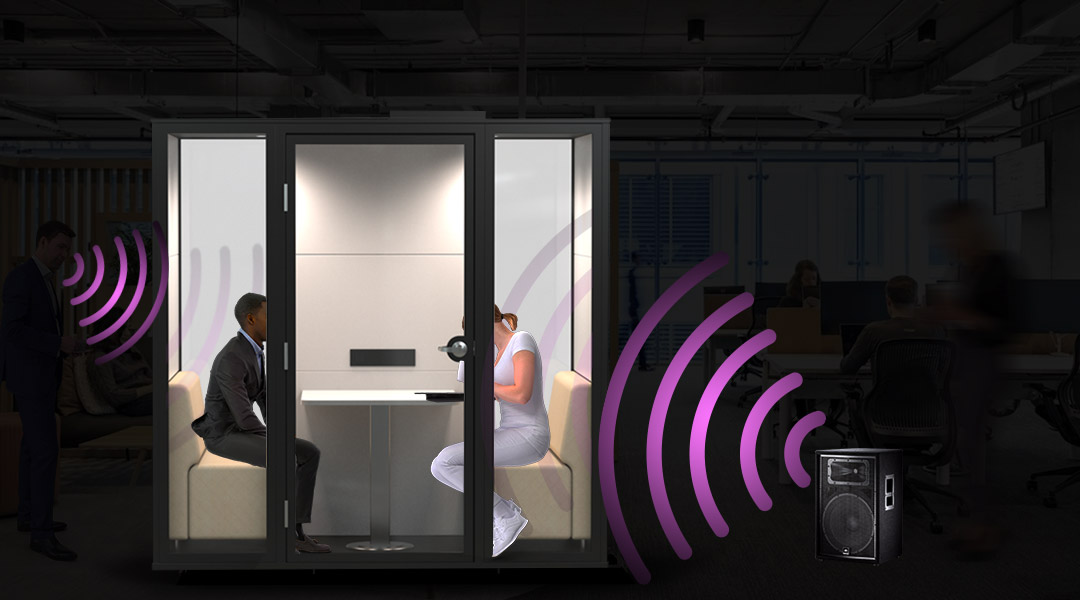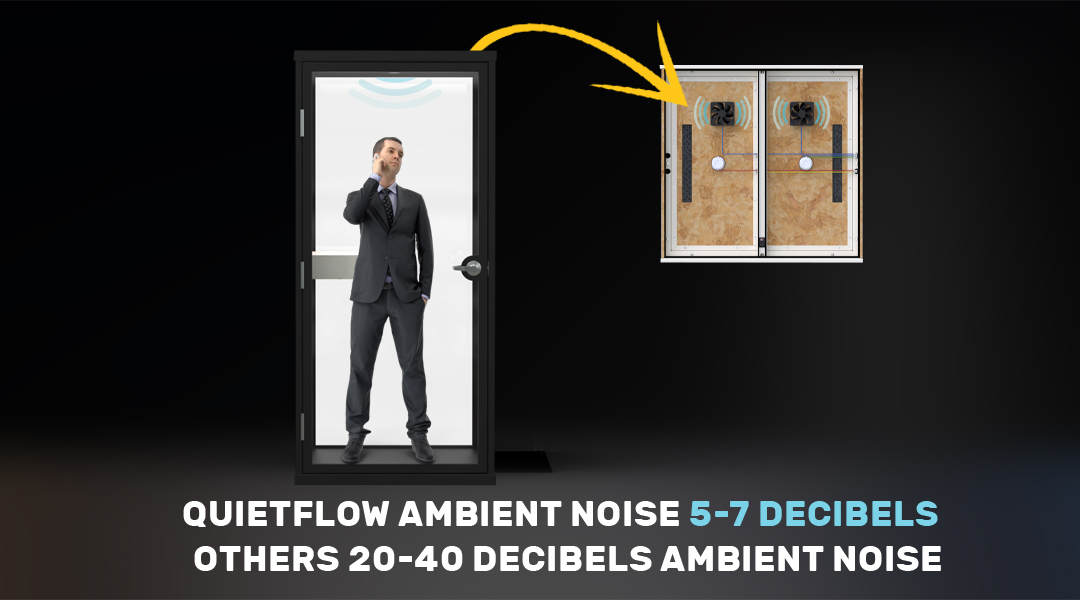Understanding QuietFlow™ ventilation in Decibel privacy pods
What is the Spaceworx Quietflow™ Ventilation system? How does this differ from other privacy pods ventilation systems?
With the increasing number of modular privacy booths we seek to cover the different types of ventilation systems in modular pods, the basics on how the ventilation systems work and how it differs from the Spaceworx Quietflow™ system.
The majority of fully enclosed privacy booths advertise some sort of ventilation system, typically consisting of computer fans circulating air into the pod or exhausting air out of the pods. As with most things, careful consideration should be given to the details of these systems as all ventilation systems are not created equal. Below is an outline of the main points to take in consideration as well how the Spaceworx Quietflow™ systems differ..
- Airflow Direction: The first thing to consider when looking at ventilation systems is the airflow direction. A Lot of systems are designed only to exhaust air meaning they strictly pull air out of the pods with the intent of keeping the pods from overheating inside. The drawback of this design is that the pods typically do not get fresh air pushed into the pods, so after a while the pods tend to still get stuffy and lack fresh air and oxygen. The Spaceworx Quietflow™ system can be set up to work in two ways: the first method is to strictly blow fresh air into the pods, and the second method is to have a balanced system of air circulation. In the first scenario, which seems to have the best reviews from customers, fresh air is set up to blow down the side walls so as to not blow air directly onto the users inside the pods. On the second scenario, the pods can be set up to have a balanced system so on one side of the pods it circulates new fresh air into the pods while on the other side it can exhaust or extract air creating a perfectly balanced system with constant fresh air in while old air is being pulled out.


- Soundproofing: Having the perfect balance between soundproofing and good airflow isn’t an easy design to achieve. The reason for this is because the more soundproof the air flow channel, typically the less airflow you will receive in the pod. On the other hand, some pod manufacturers simply place fans on the roof and have holes straight through the ceiling. While this method may provide good airflow, the overall pod will have ineffective soundproofing with the ability for all noise to go straight through the holes. Other privacy pods manufacturers focus on superior sound performance by removing airflow inside the pods severely affecting users who cannot stay in the pods much longer than 15-20 minutes at a time.


- Noise: Having a loud background noise while on the phone is never fun. Unfortunately, fans do make noise and typically the more airflow the fans provide, the noisier the fans get. What are the decibel noise levels the fans provide? How is any noise from the fans mitigated or reduced inside the pods? These are questions that should be asked when looking into the ventilation systems. The Quietflow system is designed with specific fan blades that provide the maximum airflow while having a very low noise ratio. While it is not possible for any good ventilation fan to create nonoise, the Quietflow is designed to mitigate any noise to a minimum on the inside of the pods. The ambient noise of the fans inside the pods is approximately 5-7 decibels.

- CFM / Air Changes: A typical conference room will provide anywhere from 4-10 air changes per hour. This is in accordance with ASHRAE Standard 62.1. Air change rate is a measure of the air volume added to or removed from a space in one hour. This is an important measurement when looking at modular pods. Air changes per hour are calculated by the CFM or cubic feet of air moved per minute of the ventilation system. All fans will have a CFM rating on how much air they can circulate per minute. It is important to note that, just because the fans might be moving a certain CFM does not mean that this is the exact CFM inside the pods.
- Airflow will often be restricted by the size of any air vents, channels, ducts, insulation etc. Some privacy pods manufacturers advertise that all air will be completely changed/recirculated inside the pods every minute. It is important to ask what this is based on, is it based on the CFM of the fans? What about the size and restriction of any vents? The Quietflow™ system has 170 CFM (cubic feet per minute) exchange of air rate for a Decibel Single Phone Booth and 340 CFM for the Decibel Double Pod. This equates to 170 cubic feet per minute of air exchange or 2.8 air exchange per second, depending on the size of the pod. These numbers are, however, based solely on the capacity of the fans and do not take into account account any additional restrictions. Based on the acoustical properties and vent restrictions, the actual air exchange equates to 100 cubic feet per minute or 1.6 per second, which is significantly more than most HVAC systems and normal conference rooms.
- Ventilation is not AC: A common misconception with ventilation systems in modular pods is that they are equipped with air conditioners or cooling systems. It is important to note that we are not aware of any manufactures that provide actual air conditioning in their pods. With all modular pods, they are strictly designed to circulate room temperature air outside the pods with the intent to keep the pods from getting too hot or stuffy.Placement of the pods in the office or location, and air temperature conditions in your overall environment will have an impact on the airflow performance inside the pods. For example placing a pod underneath a heating duct will circulate warm air inside the pod in the winter time causing the pod to feel too warm and stuffy inside. On the other hand, placing the pod directly under an air conditioning duct may cause the pods to feel too cold. It is important to place the pods in areas of the spaces where the air will circulate in a well balanced manner and where conditioned air will help to provide the optimal temperature and user experience overall.

